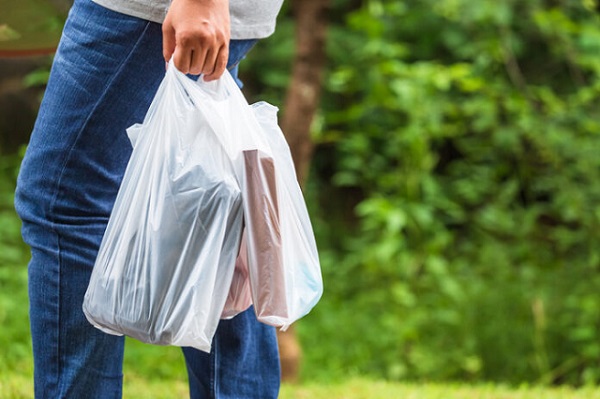From HeartlandDailyNews.com
” the FCR report states that polypropylene bag production has caused a 500 percent increase in greenhouse gas emissions, and that it is unlikely the emissions will be offset significantly by bag reuse, since most consumers throw them away far earlier than expected. “
Recent research has revealed that plastic bag bans in California and New Jersey have resulted in an increase in plastic waste, rather than the decrease intended.
A new report from the California Public Interest Research Group (CALPIRG) shows that California’s 2014 plastic bag ban, SB 270, has led to more plastic waste, not less, over the 10-year period since the law was enacted.
Likewise, a report from Freedonia Custom Research (FCR) found that more plastic containers and bags were used in New Jersey after that state’s plastic bag ban. The FCR report also found the increased use of polypropylene bags as a result of the ban contributed to a significant increase in greenhouse gas emissions.
Californians Use More Plastic after Ban
CALPIRG is a consumer advocacy group that supported the initial plastic bag ban and now supports a stricter plastic bag bans in California that removes the “loophole” they claim the existing California law created. The law permits retailers to sell thicker plastic bags for a fee, which CALPIRG said in a January 2024 report led to an increase in plastic waste because customers still treat them as single-use bags.
“While theoretically “reusable,” it appears that many shoppers are disposing of those bags in the same ways as single use bags, potentially undermining the effectiveness of plastic bag bans at reducing plastic waste overall,” CALPIRG reports.
In Alameda County, California, for example, the thicker reusable bags resulted in more plastic waste by weight despite decreasing the number of bags consumed, says the CALPIRG report.
“Since these “reusable” plastic bags are at least four times thicker than typical single-use plastic bags, the estimated 13 million of them sold in Alameda County in 2021 likely surpassed the 37 million single-use plastic bags sold annually pre-ban on a plastic weight basis,” CALPIRG said.
The weight of plastic bags discarded per 1,000 people increased from 4.13 tons in 2004 to 5.89 tons in 2021.
New Jersey Plastic Consumption Spikes
In New Jersey, the results of a 2022 plastic bag ban were similar, according to another, recent report from FCR, a division of MarketResearch.com.
FCR reports that following the thin-film plastic bag ban, the shift to alternatives resulted in a massive increase in plastic consumption.
“[F]ollowing New Jersey’s ban of single-use bags, the shift from plastic film to alternative bags resulted in a nearly 3x increase in plastic consumption for bags,” FCR’s report states. “At the same time, 6x more woven and non-woven polypropylene plastic was consumed to produce the reusable bags sold to consumers as an alternative.”
Despite being advertised as environmentally friendly, the FCR report states that polypropylene bag production has caused a 500 percent increase in greenhouse gas emissions, and that it is unlikely the emissions will be offset significantly by bag reuse, since most consumers throw them away far earlier than expected.
“FCR’s analysis of New Jersey bag demand and trade data for alternative bags finds that, on average, an alternative bag is reused only two to three times before being discarded, falling short of the recommended reuse rates necessary to mitigate the greenhouse gas emissions generated during production and [to] address climate change,” said FCR.
‘More Expensive, Worse for the Environment’
There is a reason why thin-film plastic bags are commonly used in the first place, says H. Sterling Burnett, Ph.D., director of The Heartland Institute’s Arthur B. Robinson Center on Climate and Environmental Policy, and it is not shocking that people began using other types of plastic bags.
“It is not surprising that the plastic bag bans in New Jersey and California backfired, I predicted as much 10 years ago when I was writing on the then relatively new phenomena of plastic bag bans,” Burnett said. “Plastic bags have many virtues, the primary among them being convenience and ease of reuse.”
As in the case with polypropylene bags detailed in the FCR report, attempting to get rid of plastic bags carries costs, Burnett says, and if cities and states were so concerned about the impact of volumes of plastic waste, they should have looked into other solutions.
“Alternatives to plastic bags are more expensive, worse for the environment, and sometimes bad for public health,” Burnett said. “Recycling plastic bags should have been the response to cities concerned about plastic waste, not banning them.”
Not only are the thicker and reusable bags more costly, but the bans drive stores toward returning to paper bags, Burnett says, and support countries like China which stand to gain economically from spikes in reusable bag manufacturing.
“The cities cost themselves, their residents, and the United States economy money, destroying trees and boosting China, which dominates the reusable bag market, in the process,” Burnett said.
Linnea Lueken ([email protected]) is a research fellow with the Arthur B. Robinson Center on Climate and Environmental Policy at The Heartland Institute.
For more on plastic bag bans, click here and here.






















